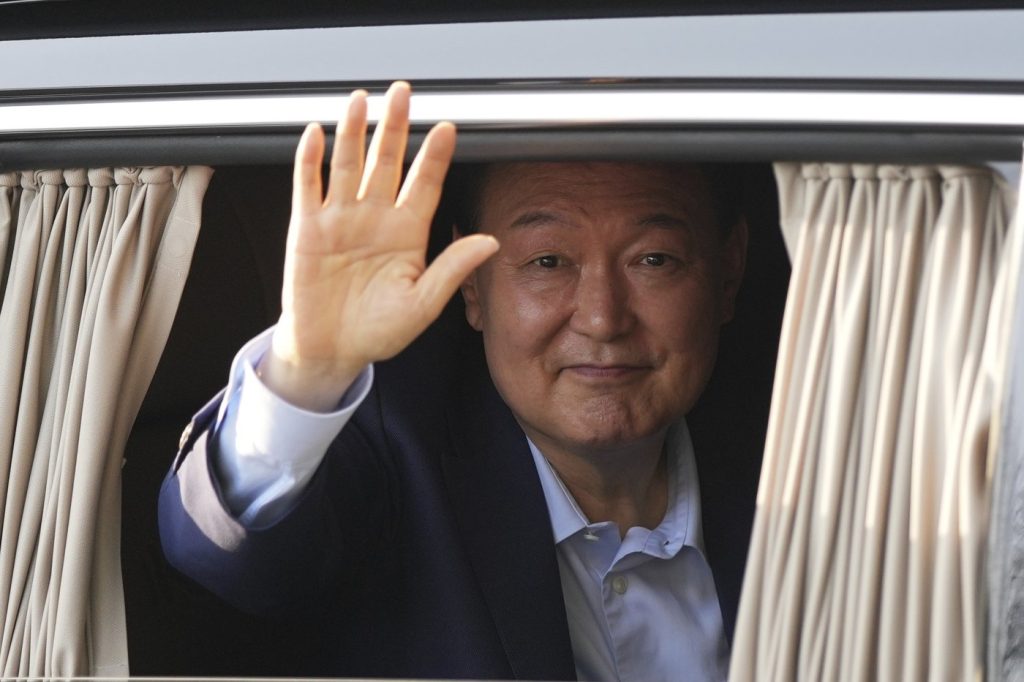SEOUL, South Korea (AP) — Former South Korean President Yoon Suk Yeol left the presidential residence in Seoul on Friday, returning to his private home just one week after the Constitutional Court removed him from office due to his controversial declaration of martial law in December 2024. This decision marked a significant moment in South Korea's political landscape, igniting ongoing debates about governance and authority in the country.
In the days leading up to Yoon's departure, moving trucks were regularly seen at the presidential compound located in the Hannam-dong district, previously the site of a major law enforcement operation in January that culminated in Yoon's detainment. Having faced a serious legal challenge, Yoon was released from custody in March after a Seoul court deemed his arrest unwarranted. The former president returned home with his wife, Kim Keon Hee, along with their collection of 11 dogs and cats, signaling a personal return amidst public turmoil.
As Yoon’s black van approached the gates of the presidential compound, he exited the vehicle smiling and waving to a crowd of supporters who had gathered to greet him. Displaying a seemingly confident demeanor, he engaged in handshakes and embraces with dozens of supporters before departing from the compound. Upon arriving at his apartment complex in affluent southern Seoul, Yoon was welcomed by his supporters, who chanted his name and expressed their allegiance as they crowded around him.
Simultaneously, the political atmosphere was charged, with both supporters and critics of Yoon gathering in nearby streets, underscored by a heavy police presence. Protesters held a mix of signs, with messages ranging from expressions of loyalty, such as “Your excellency Yoon, we will carry on with your spirit,” to vehement calls for severe punishment, including “Give Yoon Suk Yeol the death penalty!” This divergent response from the public reflects the polarized views surrounding Yoon's presidency and the circumstances of his impeachment.
In a public statement, Yoon conveyed his gratitude to supporters who have rallied for his reinstatement, emphasizing his commitment to striving for a “free and prosperous Republic of Korea,” invoking the country’s formal name. Yoon, a conservative who narrowly won the presidency in the 2022 election, had imposed martial law on December 3, 2024, during a period of rising tensions, accusing “anti-state” liberals of obstructing his agenda. His declaration included a suspension of legislative activities and a military presence around the National Assembly; however, lawmakers quickly countered by lifting the martial law just hours after its implementation.
The political crisis escalated when the Assembly impeached Yoon on December 14, leading to the Constitutional Court's decision last week to uphold the impeachment and remove him from office. This ruling has set the stage for a presidential election scheduled for June 3, 2025, as South Korea navigates a pivotal juncture in its governance.
Despite the gravity of his removal, analysts suggest it is “unlikely that Yoon will fade into the background.” With the approaching election cycle, he may seek to consolidate his support while maintaining influence within the conservative People Power Party, which has been filled with loyalists to his leadership. Such a strategy becomes vital for Yoon as he faces a distinct criminal trial on rebellion charges, which carry severe penalties, that could profoundly affect his political future. As the political landscape in South Korea continues to evolve, Yoon's actions and positioning within his party will be closely scrutinized by both his supporters and adversaries alike.










